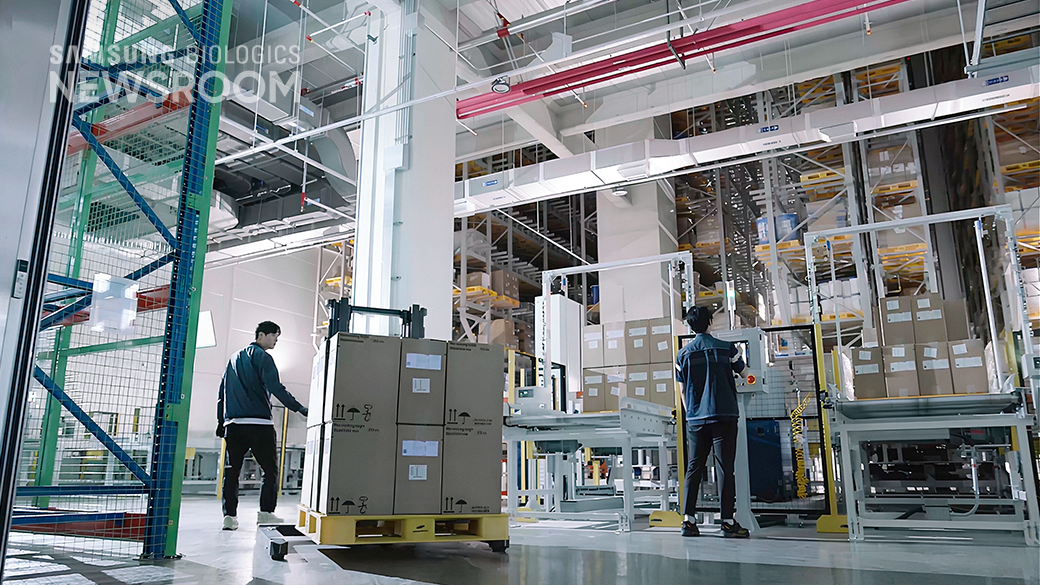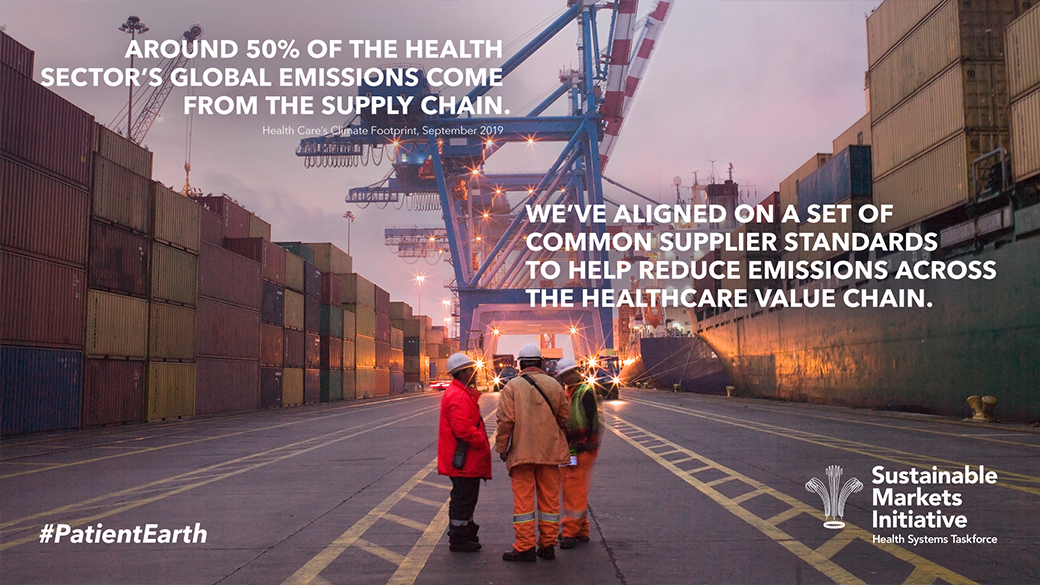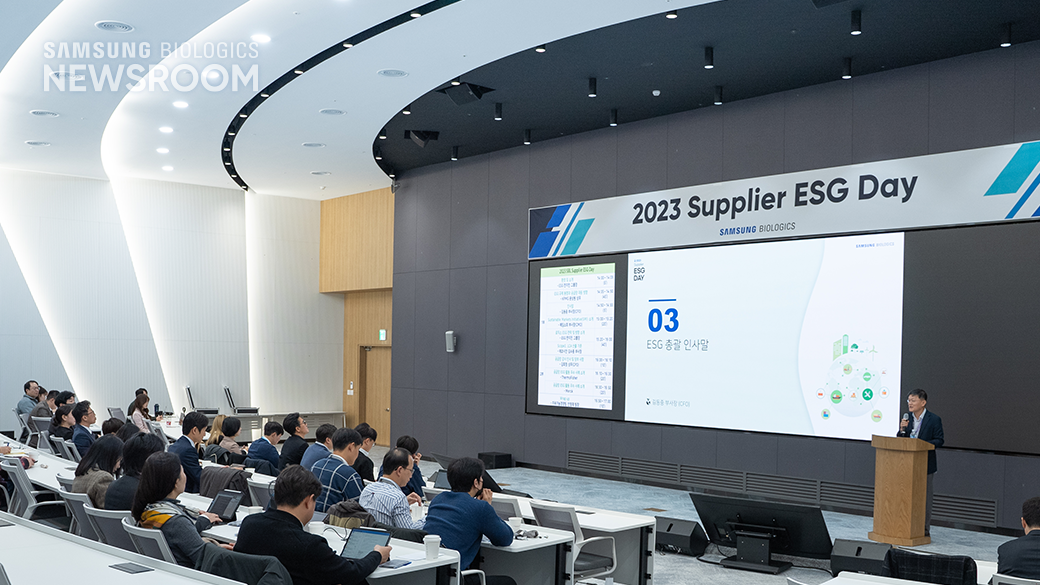Press Releases
Shaping a sustainable supply network for net-zero health systems
How Samsung Biologics nurtures its supplier partnerships to drive decarbonization initiatives

With 2023 being the hottest year on record , the need for constructive action in decarbonizing health systems is at a critical point. The use of fossil fuels and plastics still prevails in the healthcare industry, and its supply chains contribute to over half of the sector’s greenhouse gas (GHG) emissions.
There are challenges to reducing healthcare supply chains emissions, specifically a lack of common standards that makes benchmarking and measurement of emissions reductions difficult. Together with its global and domestic supply partners, Samsung Biologics is taking concrete action to address these challenges, while improving health outcomes.
“Aligning our sustainability strategy with our global and local partners is a fundamental step towards achieving our vision for decarbonizing healthcare supply chains,” said Jeongjae Ahn, Senior Director of Sustainable Business at Samsung Biologics. “While we team up with global pharmaceutical companies to develop concerted strategies towards accomplishing carbon-free healthcare, we have internally been nurturing proactive collaboration with our domestic suppliers and emboldening them to learn and implement the strategies for a sustainable supply chain.”
Building a viable framework for net-zero healthcare with global partners
As a member of the Sustainable Markets Initiative’s Health Systems Task Force, Samsung Biologics, along with 13 other global public-private health system leaders, has committed to bringing practical solutions to decarbonizing highly regulated, multi-layered healthcare supply chains. The task force is working collaboratively with suppliers to achieve emissions reduction targets, acknowledging each supplier’s starting point and sustainability maturity.

Earlier this year, the task force set joint, minimum climate and sustainability targets for suppliers , to address emissions across the value chain and reduce the complexity of multiple asks for suppliers.
• Assess and disclose Scope 1, 2, and 3 GHG emissions
• Set near-term targets aligned to the 1.5-degree pathway
• Cascade standards and targets to upstream suppliers, including emissions disclosure
• Switch to renewable power
• Explore options to source renewable heat
• Decarbonize transport solutions
• Reduce water usage and set targets for water efficiency
• Set targets to reduce waste and energy and increase reuse of materials in manufacturing
Furthermore, it acknowledges the complex nature of healthcare supply chains, which makes proper measurement of GHG emissions difficult. In a joint effort to support suppliers, the taskforce members have aligned on a standard methodology for life cycle assessments (LCAs), which suppliers can leverage to measure the environmental impact of their products.
“Granted about 80% of supply chain emissions stem from Scope 3 raw material procurement, forging collaboration with our suppliers is a prerequisite for us to achieve our own net-zero target by 2050,” said Ahn. “Therefore, we have proactively worked with our global partners to devise a viable framework that healthcare suppliers of all levels can apply to their business operations.”
Engaging local suppliers with solutions to decarbonization
Samsung Biologics believes the road to a net-zero supply chain starts from a grassroots engagement with its domestic partners. With the complex global regulatory process and rising emphasis on environmental, social, and governance (ESG) compliance, greener operations have become vital for overall business sustainability.

In November, Samsung Biologics held its inaugural Supplier ESG Day at its headquarters to share ESG knowledge and guidance on decarbonization with its local suppliers. At the event, experts provided insights on ESG governance, while representatives from global suppliers presented case studies and tangible methods that local suppliers could apply to their operations.
“I believe Samsung Biologics’ Supplier ESG Day did bridge the ESG knowledge gap between the global and domestic companies,” said one raw material supplier. “Learning what we can do to reduce carbon emissions at the local level inspired me that though we are a small company, we could co-work with a global company like Samsung Biologics to build a sustainable healthcare supply chain.”
As Samsung Biologics continues to expand its capacity and global footprint, with the construction of Plant 5 and Bio Campus II, sustainable management has become a cornerstone for its business expansions. Samsung Biologics will remain dedicated to its vision of building a sustainable future in collaboration with its global suppliers and pharmaceutical companies.
Related Contents
Press Releases Samsung Biologics engages suppliers to advance global decarbonization targets
Samsung BIO Insight Building a Sustainable Future from the Ground Up
How Samsung Biologics nurtures its supplier partnerships to drive decarbonization initiatives

With 2023 being the hottest year on record , the need for constructive action in decarbonizing health systems is at a critical point. The use of fossil fuels and plastics still prevails in the healthcare industry, and its supply chains contribute to over half of the sector’s greenhouse gas (GHG) emissions.
There are challenges to reducing healthcare supply chains emissions, specifically a lack of common standards that makes benchmarking and measurement of emissions reductions difficult. Together with its global and domestic supply partners, Samsung Biologics is taking concrete action to address these challenges, while improving health outcomes.
“Aligning our sustainability strategy with our global and local partners is a fundamental step towards achieving our vision for decarbonizing healthcare supply chains,” said Jeongjae Ahn, Senior Director of Sustainable Business at Samsung Biologics. “While we team up with global pharmaceutical companies to develop concerted strategies towards accomplishing carbon-free healthcare, we have internally been nurturing proactive collaboration with our domestic suppliers and emboldening them to learn and implement the strategies for a sustainable supply chain.”
Building a viable framework for net-zero healthcare with global partners
As a member of the Sustainable Markets Initiative’s Health Systems Task Force, Samsung Biologics, along with 13 other global public-private health system leaders, has committed to bringing practical solutions to decarbonizing highly regulated, multi-layered healthcare supply chains. The task force is working collaboratively with suppliers to achieve emissions reduction targets, acknowledging each supplier’s starting point and sustainability maturity.

Earlier this year, the task force set joint, minimum climate and sustainability targets for suppliers , to address emissions across the value chain and reduce the complexity of multiple asks for suppliers.
• Assess and disclose Scope 1, 2, and 3 GHG emissions
• Set near-term targets aligned to the 1.5-degree pathway
• Cascade standards and targets to upstream suppliers, including emissions disclosure
• Switch to renewable power
• Explore options to source renewable heat
• Decarbonize transport solutions
• Reduce water usage and set targets for water efficiency
• Set targets to reduce waste and energy and increase reuse of materials in manufacturing
Furthermore, it acknowledges the complex nature of healthcare supply chains, which makes proper measurement of GHG emissions difficult. In a joint effort to support suppliers, the taskforce members have aligned on a standard methodology for life cycle assessments (LCAs), which suppliers can leverage to measure the environmental impact of their products.
“Granted about 80% of supply chain emissions stem from Scope 3 raw material procurement, forging collaboration with our suppliers is a prerequisite for us to achieve our own net-zero target by 2050,” said Ahn. “Therefore, we have proactively worked with our global partners to devise a viable framework that healthcare suppliers of all levels can apply to their business operations.”
Engaging local suppliers with solutions to decarbonization
Samsung Biologics believes the road to a net-zero supply chain starts from a grassroots engagement with its domestic partners. With the complex global regulatory process and rising emphasis on environmental, social, and governance (ESG) compliance, greener operations have become vital for overall business sustainability.

In November, Samsung Biologics held its inaugural Supplier ESG Day at its headquarters to share ESG knowledge and guidance on decarbonization with its local suppliers. At the event, experts provided insights on ESG governance, while representatives from global suppliers presented case studies and tangible methods that local suppliers could apply to their operations.
“I believe Samsung Biologics’ Supplier ESG Day did bridge the ESG knowledge gap between the global and domestic companies,” said one raw material supplier. “Learning what we can do to reduce carbon emissions at the local level inspired me that though we are a small company, we could co-work with a global company like Samsung Biologics to build a sustainable healthcare supply chain.”
As Samsung Biologics continues to expand its capacity and global footprint, with the construction of Plant 5 and Bio Campus II, sustainable management has become a cornerstone for its business expansions. Samsung Biologics will remain dedicated to its vision of building a sustainable future in collaboration with its global suppliers and pharmaceutical companies.
Related Contents
Press Releases Samsung Biologics engages suppliers to advance global decarbonization targets
Samsung BIO Insight Building a Sustainable Future from the Ground Up